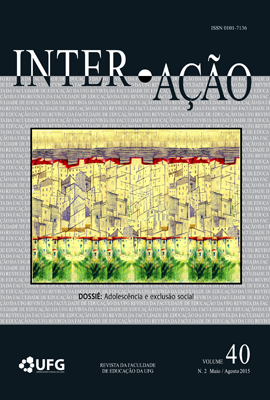ADOLESCENTES: PROBLEMA PREVENTIVO NO ESTADO DO PARANÁ (1918-1928)
DOI:
https://doi.org/10.5216/ia.v40i2.32842Palavras-chave:
Prevenção. Adolescente. Discursos dos Governadores do Paraná (1918-1928).Resumo
No estado do Paraná, no período de 1918 a 1928 ocorria uma relação entre delinquência e modernidade. Nesse sentido, as crianças e adolescentes que viviam à margem da sociedade eram considerados responsáveis pelo aumento da criminalidade. Desse modo, a questão da pobreza, dos menores abandonados, dos desvalidos e da delinquência juvenil era expressa nos discursos de várias autoridades, como dos governantes e dos juristas que buscavam na infância pobre a origem dos problemas da criminalidade. A terminologia “menores delinquentes” era utilizada pelo governador Affonso Alves de Camargo. Também era preciso regenerar, moldar os menores “vadios”, “viciosos” e “libertinos”, conforme discurso do governador Caetano Munhoz da Rocha Neto.Downloads
Downloads
Publicado
Como Citar
Edição
Seção
Licença
A Inter-Ação utiliza como base para transferência de direitos a licença Creative Commons Attribution 4.0 para periódicos de acesso aberto (Open Archives Iniciative - OAI). Por acesso aberto entende-se a disponibilização gratuita na Internet, para que os usuários possam ler, baixar, copiar, distribuir, imprimir, pesquisar ou referenciar o texto integral dos documentos, processá-los para indexação, utilizá-los como dados de entrada de programas para softwares, ou usá-los para qualquer outro propósito legal, sem barreira financeira, legal ou técnica.
Autores que publicam neste periódico concordam com os seguintes termos:
1) Autores mantém os direitos autorais e concedem à revista o direito de primeira publicação, com o trabalho simultaneamente licenciado sob a Licença Creative Commons Attribution que permite o compartilhamento do trabalho com reconhecimento da autoria e publicação inicial nesta revista.
2) Autores têm autorização para assumir contratos adicionais separadamente, para distribuição não-exclusiva da versão do trabalho publicada nesta revista (ex.: publicar em repositório institucional ou como capítulo de livro), com reconhecimento de autoria e publicação inicial nesta revista.
3) Autores têm permissão e são estimulados a publicar e distribuir seu trabalho online (ex.: em repositórios institucionais ou na sua página pessoal) a qualquer ponto antes ou durante o processo editorial, já que isso pode gerar alterações produtivas, bem como aumentar o impacto e a citação do trabalho publicado.















